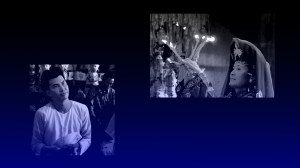In this series
I lived in various parts of Japan, including the city of Yokohama, for 26 years. One of my neighbors was a practicing shaman who described herself as a “pipe” through which God’s blessings would flow. We invited her to our home and had deep conversations about our faiths, religious practices, and ups and downs in our work.
Japanese shamanism is not a religion but a way of exercising spiritual guidance in the context of an animist worldview. It likely arose from the shamanistic practices of the Ainu, an Indigenous ethnic group in northern Japan.
In ancient times, shamans were mainly involved in political affairs. The role of shaman was almost exclusively held by women in pre-Buddhist Japan around the eighth century. Today, shamans tell fortunes, connect the living and the dead as mediums, conduct salvific rites for the deceased, and provide counseling and healing ministries.
Three traditional groups of shamans exist today: the miko, who work mainly in Shinto shrines and dance to stabilize the cosmic axis connecting heaven and earth; the kuchiyose, who are masters of telepathy, mediumship, necromancy, and divination and gain knowledge that they use in fortune telling when they are possessed; and the jussha (magicians) and gyōsha (practitioners), who are key figures of Japanese “new religions” like the modern Shinto sect Tenrikyō.
In the last 50 years, interest in shamanism has rapidly increased. Some factors for this development include the abolishment of State Shintō in 1945, which allowed new sects to develop, and the growth of individualism, which freed people to fashion their own patchwork religions by drawing on old occult practices and supernatural phenomena. There are about ten times as many books on shamanism published today than in the 1950s.
Japan is a fast-paced and technologically advanced society, but when it comes to worldviews, the country has never been modern. High school and university education puts a thin layer of Western rationalism over an otherwise solid core of premodern thinking in which shamanism plays a vital role.
This is reflected in how the role of a pastor is conceived in some Japanese churches, where pastors’ prayers, particularly for healing, are considered more powerful than those of lay people. Only pastors can deliver the benediction, which is often understood as a mantra with inherent spiritual power. Pledging obedience to the pastor may also be part of public baptismal vows, and pastors can forbid church members from visiting other congregations.
Within the church, Japanese evangelicals must address the danger of spiritual abuse, especially as the culture favors a top-down leadership style. The Yawata scandal in 2005, where a pastor sexually abused women and girls in his church while claiming to have divine authority over them, shook the Japanese church and has since galvanized greater awareness and preventive action.
Mitsuru Murakami, a pastor and expert on churches that deteriorated into cults, and Jean Dôgen, a missionary from Truth Word Mission Church Kansai, founded organizations that help victims. Missionary William Wood’s book When Churches Turn into Cults: Fostering Biblical Discernment was also widely recognized and challenged pastors to rethink their leadership styles.
Outside the church, Japanese evangelicals must tackle worldview issues that are commonly only addressed by shamans or Shinto and Buddhist practitioners. These topics may include the felt need for protection against hostile spiritual beings, healing, discernment in important decisions, and ancestor veneration. If evangelicals don’t address these topics, Christianity will likely not be considered a relevant religion, which may lead believers to seek answers to these questions outside of the Christian faith.
The Old Testament is full of references that candidly speak against activities that fall into the field of Japanese shamanism. The most prominent shaman of his age, Balaam, attested to this: “There is no divination against Jacob, no evil omens against Israel. It will now be said of Jacob and of Israel, ‘See what God has done!’” (Num. 23:23). Divination and sorcery are not necessary for the people of God because the Lord will guide and provide for them. Seeking instruction from any other god would be an act of infidelity.
Martin Heisswolf is the author of Japanese Understanding of Salvation: Soteriology in the Context of Japanese Animism. Read more in our series’ lead article, Shamans, Sorcerers, and Spirits: How Christians in Asia Grapple with the Supernatural.

















